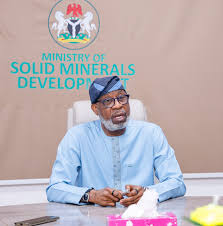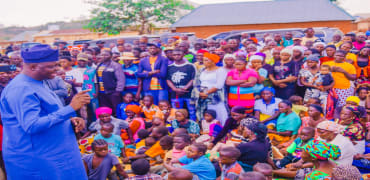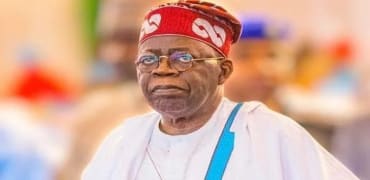Tinubu’s Mining Reforms Attract $800 Million in Foreign Investments – Alake
Tinubu’s Mining Reforms Attract $800 Million in Foreign Investments – Alake
By Achimi muktar
In a dramatic turnaround that’s catching global attention, Nigeria’s solid minerals sector has emerged as a goldmine of opportunity — literally and figuratively — pulling in a massive $800 million in foreign investments in 2025 alone, thanks to bold reforms championed by President Bola Ahmed Tinubu.
According to Minister of Solid Minerals Development, Dr. Dele Alake, the wave of investments and revenue surge is no accident. It’s the product of a laser-focused policy overhaul that’s transforming Nigeria’s once-overlooked mining sector into a frontline contributor to economic growth and diversification.
“When we resumed, the entire sector was generating just ₦6 billion annually,” Alake revealed in a forthcoming State House documentary marking Tinubu’s second year in office. “By the end of 2024, we hit ₦38 billion. That’s with only 18% of our budget allocation released. The reforms are working.”
Alake pointed to landmark processing projects as proof that the world is finally paying attention to Nigeria’s mineral riches:
A $600 million lithium processing plant near the Kaduna-Niger border, set to be commissioned this quarter.
A $200 million lithium refinery near Abuja, nearing completion.
Two more processing plants in Nasarawa scheduled to launch before Q3 2025.
These developments come on the back of Tinubu’s “no licence without local value addition” policy — a game-changer that ensures Nigeria is no longer just a raw materials exporter but a value-creating economy.
“No more shipping out raw minerals. You must show how you’ll process it locally before we give you a licence,” Alake emphasized.
Despite receiving less than a fifth of its ₦29 billion allocation in 2024, the sector still raked in over ₦38 billion — an increase of more than 500%. In Q1 2025 alone:
The Mining Cadastral Office pulled in ₦6.9 billion.
The Mines Inspectorate followed closely with ₦7 billion.
But Alake isn’t stopping there. The 2025 federal budget has earmarked a whopping ₦1 trillion for mineral exploration, aimed at generating internationally certified geological data that can attract world-class investors.
“Before now, Nigeria had spent just $2 million on exploration,” said Alake. “South Africa spends over $300 million. No serious investor will touch you without data. That’s what we’re fixing.”
The Tinubu administration is also tackling one of the sector’s longest-standing headaches — illegal mining.
Over the past year alone:
300 illegal miners were arrested.
150 court cases are ongoing.
9 convictions, including foreign nationals, have been secured.
But the strategy isn’t all enforcement. Alake is combining “kinetic and non-kinetic approaches” by formalizing artisanal miners into over 250 mining cooperatives, giving them access to funding, training, and a share of the formal economy.
“We’re transforming informal miners into structured business owners. They now qualify for finance, and more importantly, they become stakeholders in Nigeria’s mining future,” Alake said.
Alake also revealed that Nigeria now chairs the African Mineral Strategy Group, a new continental alliance pushing for fairer trade deals and local beneficiation of Africa’s mineral wealth.
The global interest is palpable. From Downing Street meetings in the UK to engagement with U.S. and Gulf nations, Nigeria is suddenly being viewed as a serious player in critical minerals, especially lithium.
“The former British Deputy Prime Minister personally invited me to London to discuss lithium. The U.S. wants to reduce reliance on China and sees Nigeria as a viable alternative,” Alake disclosed.
As Nigeria’s oil-dependent economy diversifies, the mining sector is now firmly planted as a pillar of Tinubu’s economic reform blueprint. With skyrocketing revenues, a clear regulatory roadmap, and international interest soaring, the future looks rich — literally.
“Nigeria has not had it this good in the solid minerals sector,” Alake concluded. “And this is just the beginning.”


















